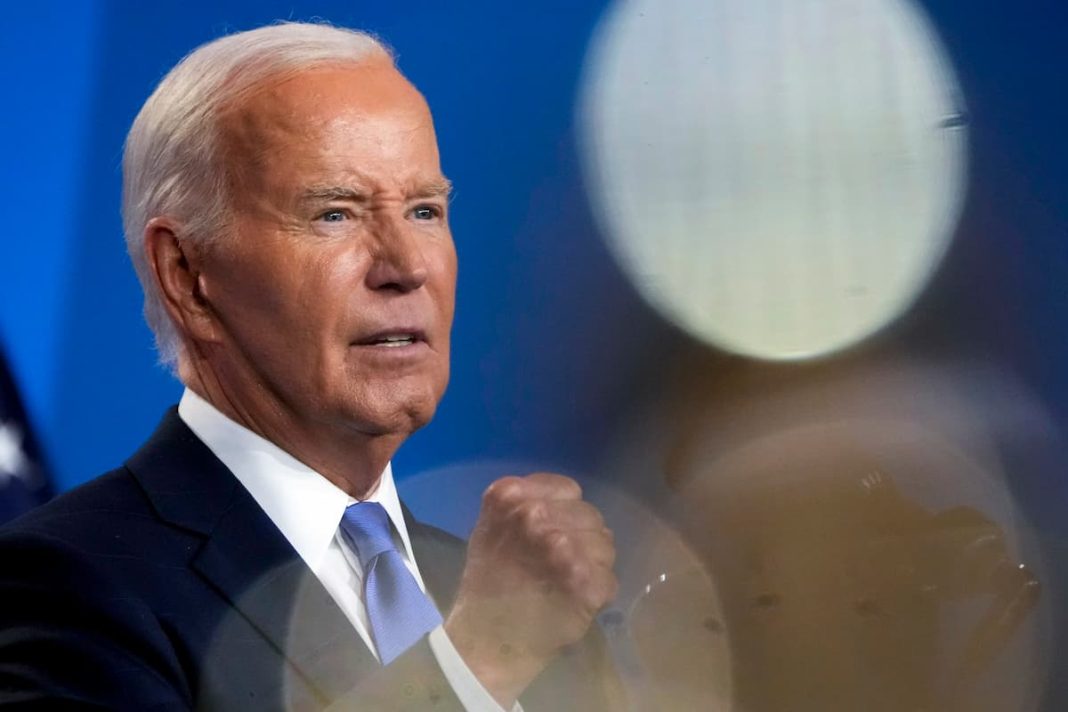US President Joe Biden has abandoned his re-election bid under growing pressure from his fellow Democrats and endorsed Vice President Kamala Harris as the party’s candidate to face Republican Donald Trump in the November election.
Biden, who at 81 is the oldest person ever to have occupied the Oval Office, said he would remain in the presidency until his term ended on January 20, 2025, and would address the nation this week.
Biden, who has not been seen in public since testing positive for COVID-19 last week, was isolating at his home in Rehoboth Beach, Delaware.
“While it has been my intention to seek re-election, I believe it is in the best interest of my party and the country for me to stand down and to focus solely on fulfilling my duties as President for the remainder of my term,” Biden wrote on X on Sunday.
The move dramatically reshapes a White House contest that has been shaken repeatedly in the last month. Biden’s disastrous June 27 debate performance drove his fellow Democrats to urge him to drop out. Then on July 13, a gunman attempted to assassinate former president Trump, 78. And last week Trump named hardline Republican US Senator JD Vance, 39, to serve as his vice presidential running-mate.
In opinion polls, Americans had expressed widespread dissatisfaction with a potential Biden-Trump rematch. Shortly after Biden’s announcement, Trump told CNN: “Harris will be easier to beat than Joe Biden would have been.”
If Harris, 59, emerges as the nominee, she would become the first Black woman to lead a major-party ticket in US history. A former attorney-general of California and former US senator, she ran unsuccessfully for president against Biden in 2020.
“My intention is to earn and win this nomination,” Harris said in a statement. “I will do everything in my power to unite the Democratic Party – and unite our nation – to defeat Donald Trump.”
Harris campaign officials, allies and supporters have started making calls to secure the support of delegates for her nomination ahead of the Democratic National Convention in Chicago in August, multiple sources said.
It was unclear whether other senior Democrats would challenge Harris for the nomination – she was widely seen as the pick of many party officials – or whether the party itself would choose to open the field for nominations.
In a hypothetical head-to-head match-up, Harris and Trump were tied with 44 per cent support each in a July 15-16 Reuters/Ipsos poll conducted immediately after the July 13 assassination attempt on Trump. Trump led Biden 43 per cent to 41 per cent in that same poll, though the two percentage point difference was not meaningful considering the poll’s three-point margin of error.
Biden’s historic withdrawal – he is the first sitting president to give up his party’s nomination for re-election since President Lyndon B. Johnson during the Vietnam War in March 1968 – leaves his replacement with less than four months to wage a campaign.
Calls for Biden to reconsider his candidacy grew much louder after his shaky, halting performance during a first debate with Trump on June 27, giving pause to even some of his biggest supporters.
Donors began to revolt and supporters of Harris began to coalesce around her. Top Democrats, including former House of Representatives Speaker Nancy Pelosi, a longtime ally, told Biden he cannot win the election.
Earlier this year, facing little opposition, Biden easily won the Democratic primary race to pick its presidential candidate, despite voter concerns about his age and health.
His staunch support for Israel’s military campaign in Gaza eroded support among some in his own party, particularly young, more liberal Democrats and voters of colour.
Many Black voters say Biden has not done enough for them, and enthusiasm among Democrats overall for a second Biden term had been low. Even before the debate with Trump, Biden was trailing the Republican in some national polls and in the battleground states he would need to win to prevail on November 5.



